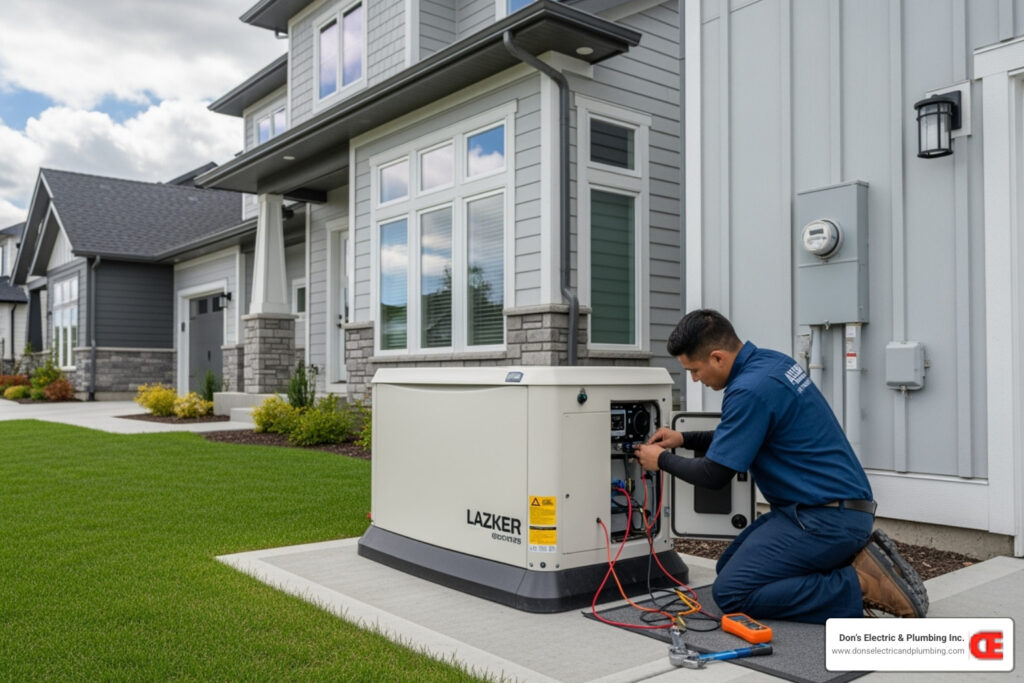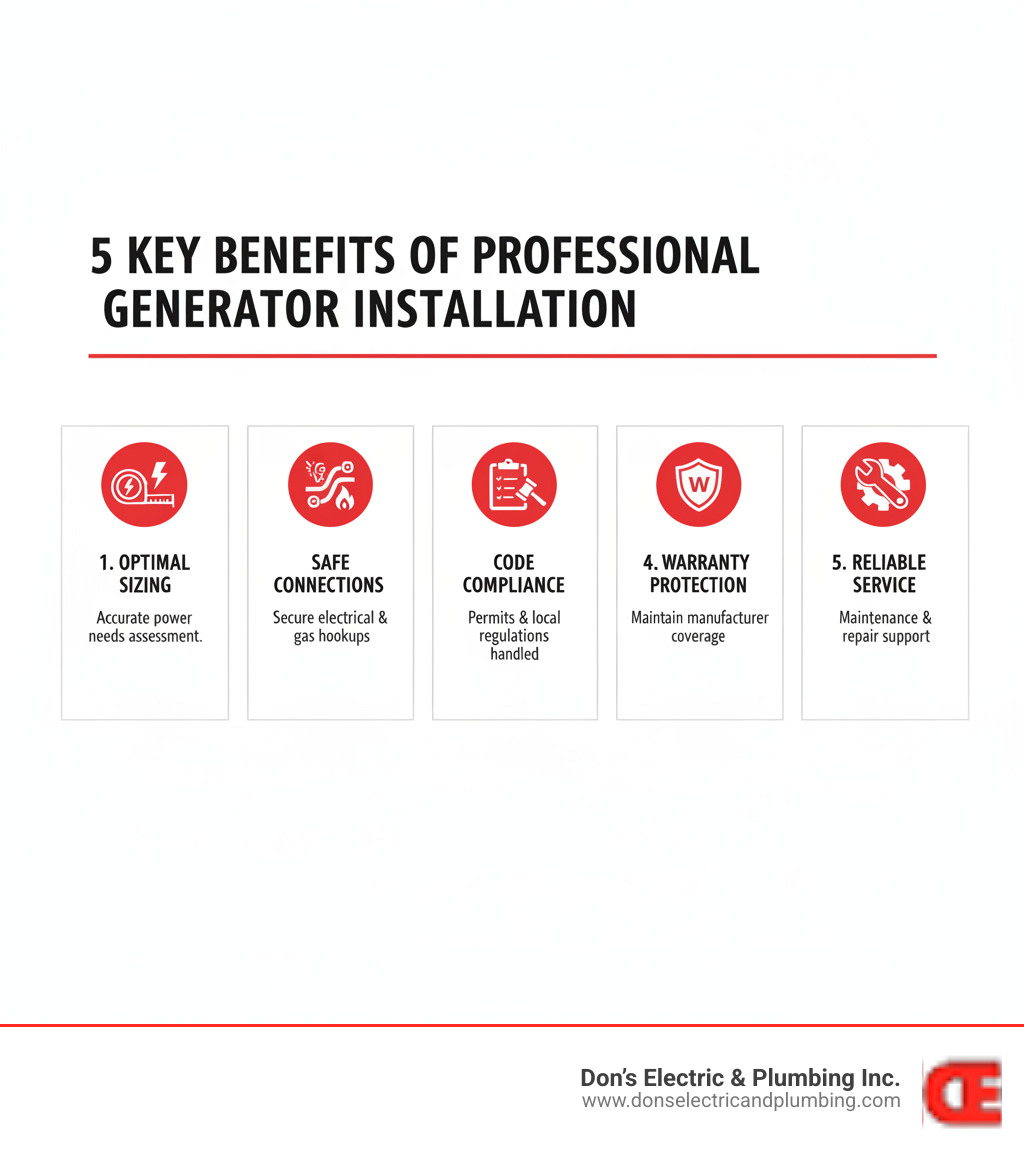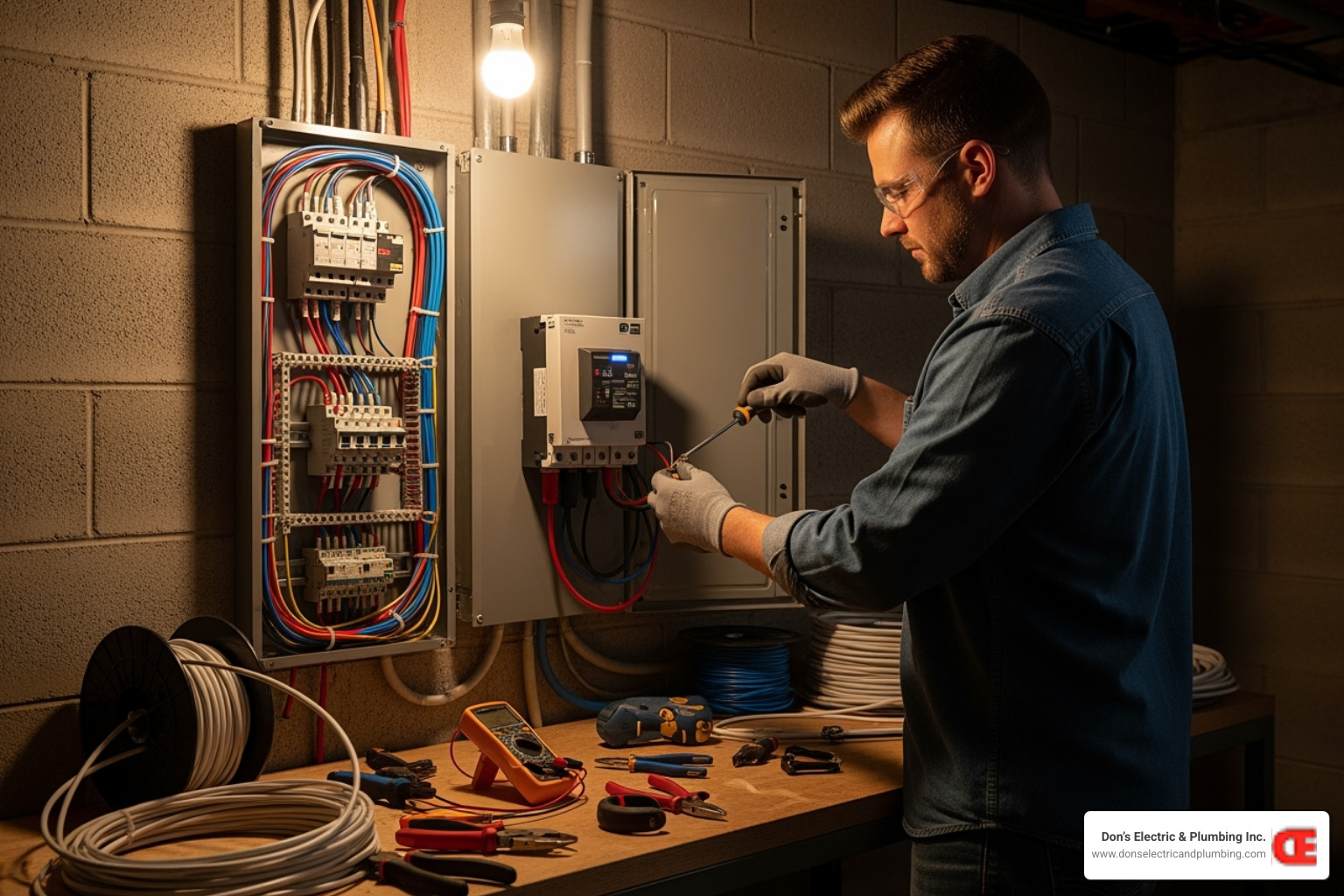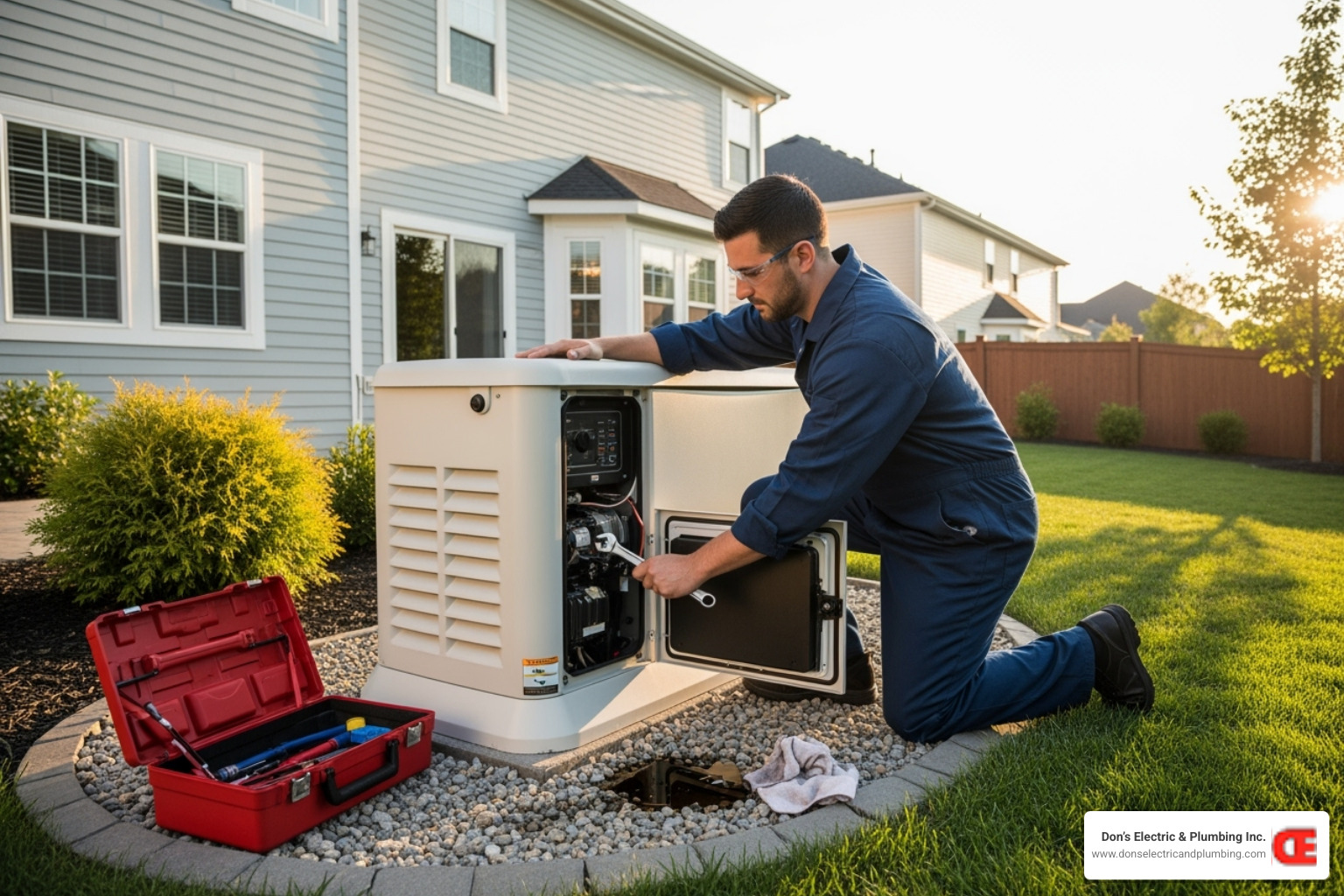Why Finding the Right Generator Installer Matters
When searching for the best generator installer in Canajoharie and the surrounding Mohawk Valley communities (including Cobleskill, Johnstown, and Fonda), you need a licensed, experienced professional who can handle the complete installation process safely and efficiently. Power outages can strike without warning, leaving your family in the dark and putting your home at risk. Severe weather, equipment failures, and grid issues can all cause extended outages that spoil food, disable heating and cooling systems, and even lead to flooding from non-functioning sump pumps.
A professionally installed backup generator provides automatic protection for your home. When utility power fails, your generator kicks in within seconds, keeping essential systems running until power returns. However, choosing the wrong installer can lead to safety hazards, code violations, voided warranties, and costly repairs. The installation process involves complex electrical work, gas connections, and local permits that require specialized expertise.
This guide will help homeowners in Canajoharie, Cobleskill, Johnstown, and Fonda find a qualified installer who can properly size, install, and service your generator system for years of reliable backup power.
Why Your Home Needs a Backup Generator
Picture this: it’s a frigid January night, and a fierce winter storm has just knocked out power to your entire neighborhood. While your neighbors scramble for flashlights and worry about their pipes freezing, your family is cozy inside, watching a movie as if nothing happened. That’s the peace of mind a backup generator brings.
Power outages aren’t just minor inconveniences; they can quickly turn into expensive headaches. When you lose electricity, your furnace stops working, putting pipes at risk of freezing. Your refrigerator warms up, threatening to spoil hundreds of dollars worth of food. If you have a sump pump, it’s now powerless against potential flooding.
A backup generator provides several key benefits:
- Uninterrupted Comfort: Your heating and air conditioning systems keep running, maintaining perfect indoor temperatures during sweltering summers or bone-chilling winters.
- Financial Protection: You can prevent food spoilage and avoid costly water damage from a non-functioning sump pump.
- Medical Safety: A generator becomes a lifeline for those who rely on powered medical devices like CPAP machines or oxygen concentrators.
- Security Continuity: Your home security systems, including alarms and cameras, stay active, keeping your family and property protected.
The greatest benefit is the peace of mind that comes with knowing you’re prepared. Finding the best generator installer ensures this protection is installed safely and reliably, giving you decades of worry-free backup power. You’re not just buying equipment; you’re investing in your family’s comfort and safety.
Understanding Your Generator Options
When protecting your home from power outages, not all generators are created equal. Let’s break down your options to help you make the best choice for your family’s needs.
Standby vs. Portable Generators
The biggest decision is choosing between a standby generator and a portable generator. Your choice depends on your priorities for convenience, power needs, and budget.
| Feature | Standby Generators | Portable Generators |
|---|---|---|
| Operation | Automatic (turns on seconds after power loss) | Manual (requires setup and manual starting) |
| Installation | Permanent (installed outside your home on a concrete pad) | Temporary (can be moved, stored when not in use) |
| Fuel Source | Natural gas or propane (connected to home’s fuel line) | Gasoline, propane, or diesel (requires manual refueling) |
| Power Capacity | Powers essential circuits or entire home | Powers select items (via extension cords) |
| Convenience | Fully automatic, seamless power transfer | Requires manual intervention, extension cords |
| Cost | Higher initial investment | Lower initial investment |
Standby generators are permanently installed and operate automatically, providing seamless power within seconds of an outage. They connect to your home’s natural gas or propane line, eliminating the need for refueling. Portable generators are a more budget-friendly, manual option. They require you to set them up, start them, and refuel them with gasoline or propane during an outage.
Choosing the Right Size and Fuel Type
Getting the right size generator is crucial. A professional load calculation will determine whether you need to power essential circuits only (like the furnace, sump pump, and refrigerator) or want whole-home power that includes central air conditioning.
Generator capacity is measured in kilowatts (kW). Common residential sizes range from 11kW to 22kW or more, depending on your home’s needs. Natural gas generators offer best convenience by tapping into your existing utility line, while propane generators are a great alternative if natural gas isn’t available. Our team can perform the detailed calculations to size your system perfectly. For expert guidance, learn about our Generator Installation Services.
Popular Generator Brands
Choosing a trusted manufacturer ensures long-term performance. Generac, Kohler, and Briggs & Stratton are industry leaders known for reliability, robust construction, and strong service networks. A qualified installer can help you compare brands based on your budget, warranty preferences, and specific needs. A generator is only as good as its installation, making your choice of installer just as important as the unit itself.
The Generator Installation Process
A professional generator installation is a multi-step process that requires careful planning and skilled craftsmanship to ensure your safety and peace of mind. When you work with the best generator installer, you’re getting a team that manages every detail.
Step-by-Step Installation Guide
A typical installation journey includes:
- Initial Consultation & Site Assessment: We discuss your needs and inspect your property to find the ideal location for the generator, considering electrical and fuel line access.
- Load Calculation & Quote: We perform precise calculations to determine the right size generator for your home and provide a clear, detailed quote.
- Permit Acquisition: We handle all the necessary paperwork and coordination with local authorities for you.
- Site Preparation & Placement: We prepare a solid concrete pad and carefully position the generator for optimal performance and service access.
- Electrical & ATS Installation: Our certified electricians wire the generator and install the Automatic Transfer Switch (ATS), the brains of the system that manages the power transfer. Learn more about our Electrical Installation Services.
- Fuel Line Connection: We safely connect the generator to your home’s natural gas or propane supply, coordinating any necessary utility upgrades.
- System Testing: We conduct a full system test, including a simulated power outage, to ensure everything works flawlessly.
Permits and Local Regulations
Dealing with permits can be daunting, but it’s a critical part of a safe installation. Permits are required to ensure your generator meets local and state safety codes. A licensed electrician is necessary to perform the work and ensure compliance with standards like the National Electrical Code (NEC). These regulations, including required safety inspections, protect your investment and your family. When you hire a professional installer, they manage this entire process, making it hassle-free for you.
How to Find the Best Generator Installer in Canajoharie and Nearby NY Communities
Finding a qualified and trustworthy installer is the most critical step in securing your home’s backup power. The right professional ensures safety, efficiency, and long-term reliability.
Key Qualities of a Top-Rated Installer
When searching for the best generator installer, look for these essential qualities:
- Licensed and Insured: This is non-negotiable. It ensures the contractor meets state safety and competence requirements and protects you from liability.
- Factory-Trained Technicians: Certifications from manufacturers like Generac or Kohler mean technicians understand the systems inside and out, which is often required to validate your warranty.
- Local Experience: An installer familiar with New York codes, climate, and permit processes in places like Canajoharie, Cobleskill, Johnstown, and Fonda can steer the project efficiently.
- Turnkey Services: A contractor who handles everything from assessment and permits to installation and maintenance provides a seamless, accountable experience.
- Positive Reviews: Check online reviews and ask for references to gauge a company’s reputation for quality and customer service.
- Comprehensive Electrical Expertise: Generator installation is complex electrical work. At Don’s Electric & Plumbing Inc., we bring decades of experience to every job. Learn more about our comprehensive electrical services.
Vetting Your Options: Questions to Ask
Once you have a shortlist, ask these key questions:
- Are you licensed and insured for electrical and gas work in New York?
- Are your technicians factory-certified by the generator brands you install?
- Do you handle all permits and inspections?
- What warranty do you provide on your installation work?
- Do you offer maintenance plans and emergency repair services?
- Do you regularly serve homes in Canajoharie, Cobleskill, Johnstown, or Fonda?
Why a Professional Installer is Crucial
Hiring a professional is essential for:
- Safety Compliance: Prevents fire hazards, gas leaks, and carbon monoxide risks.
- Warranty Validation: Most manufacturers require certified installation to keep your warranty valid.
- Optimal Performance: Ensures your generator is correctly sized and installed to function reliably.
- Code Adherence: Avoids fines and legal issues by meeting all local and national codes.
- Long-Term Support: Establishes a relationship with a trusted partner for future maintenance and emergency service. Since 1984, Don’s Electric & Plumbing Inc. has built our reputation on quality work and standing behind every job.
Budgeting for Your Generator: Costs, Lifespan, and Maintenance
Understanding the full financial picture of generator ownership helps you make an informed investment in your home’s security and comfort.
Understanding Installation and Unit Costs
A complete whole-house generator installation can range from $5,000 to $25,000. This broad range is influenced by several factors:
- Generator Size (kW): The largest cost driver, depending on whether you power essential circuits or your entire home.
- Site Complexity: The difficulty of running electrical and fuel lines affects labor costs.
- Transfer Switch Type: Larger homes may require more sophisticated and expensive transfer switches.
- Permits and Upgrades: Mandatory permit fees and potential gas meter upgrades add to the total cost.
Many installers offer financing options to make this important investment more manageable.
Long-Term Ownership: Lifespan and Maintenance
With proper care, a quality whole-house generator can last up to 20 years. Like a car, it needs regular attention to perform reliably.
Annual maintenance, typically costing $150 to $300, is crucial and often required to maintain your warranty. Service includes oil and filter changes, battery checks, and system tests. Our team provides comprehensive Electrical Repair Services to keep your unit in top condition.
Emergency Services
Choosing an installer who offers robust emergency support is vital. Look for 24/7 emergency availability, as outages and equipment failures don’t stick to business hours. Our team provides Emergency Electrical Services to ensure you’re never left without support. Be aware of signs your generator needs repair, such as failure to start, unusual noises, or warning lights, and address them quickly to prevent more serious damage.
Frequently Asked Questions about Generator Installation
Here are answers to some common questions homeowners have about generator installation.
How long does a whole-house generator last?
A quality whole-house generator can last up to 20 years with proper care. Just like a car, it requires annual professional maintenance, including oil changes and system checks, to ensure longevity and reliable performance.
Can a generator power my entire home?
Yes, depending on the size you choose. A professional installer will perform a load calculation to help you decide. You can opt for a larger model to power your entire home, including central AC, or a smaller, more budget-friendly unit to cover essential circuits only, such as your furnace, sump pump, and refrigerator.
Are permits required for generator installation?
Yes, installing a standby generator requires permits from local authorities. This is not an area to cut corners, as permits ensure your installation is safe and compliant with local building and electrical codes. A reputable installer will handle the entire permitting process for you, including all paperwork and coordination with inspectors.
Conclusion
Investing in a whole-house generator is a decision you’ll appreciate every time a storm rolls through and the power goes out. It’s an investment in your family’s comfort, safety, and peace of mind.
Finding the best generator installer is the most crucial step. A quality installation ensures years of reliable backup power and helps you avoid safety hazards, voided warranties, and costly repairs. A professional installer handles permits, correctly sizes your system, and provides long-term support for maintenance and repairs.
At Don’s Electric & Plumbing Inc., we’ve been proudly serving homeowners in Canajoharie, Cobleskill, Johnstown, and Fonda since 1984 with a commitment to quality and safety. Our certified professionals understand that your family’s security depends on getting every detail right.
Ready to protect your home with reliable backup power? Don’t wait for the next outage.







